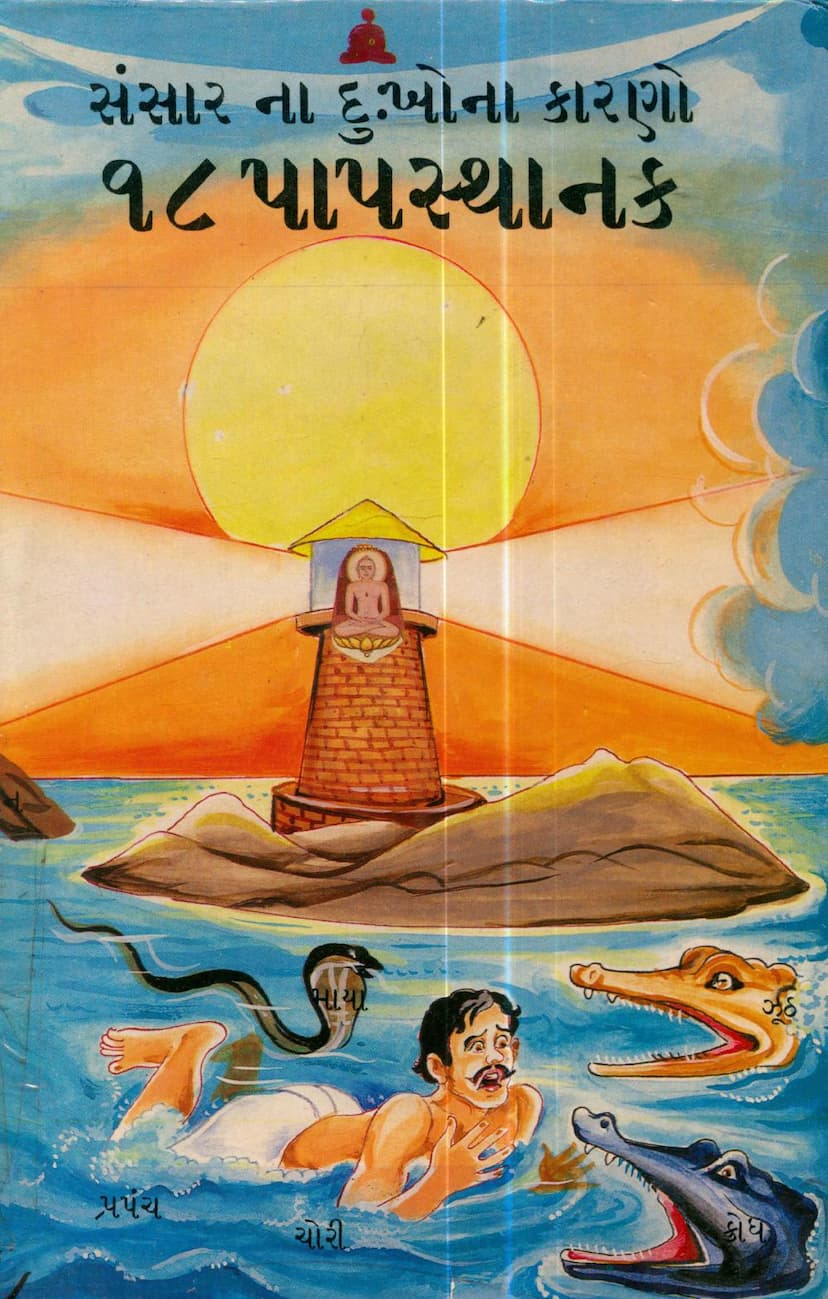Sansarna Dukhona Karno 18 Paapsthanak
Added to library: September 2, 2025

Summary
The book "Sansarna Dukhona Karno 18 Papsthanak" (The Causes of Worldly Sorrow: The 18 Places of Sin) by Purnanandvijay, published by Khushalbhai Jagjivandas, is a comprehensive Jain text that delves into the 18 negative spiritual states or actions (papsthanak) that lead to suffering in the cycle of birth and death (samsara).
The book is dedicated to the author's guru, the late Shasan Deepak Muni Shri Vidyavijayji Maharaj. The author expresses gratitude for the guidance received, comparing himself to a stone shaped by a sculptor's hammer, and humbly offers this work to his guru.
The publisher's note expresses joy in presenting the book to the readers. It highlights that despite the author's age and health, he has diligently described what the 18 papsthanaks are and their dire consequences in this book. The publisher prays that through reading, contemplation, and study of this book, readers will gain right knowledge and strive to avoid these 18 sins, thus making their precious human life successful and attaining liberation. They also express gratitude to the press owner and the financial supporters of the book.
The author's introduction (Aamukh) begins by acknowledging the difficulty humans have in remembering past wrongdoings, especially if they haven't recognized them as sins. He emphasizes that without recognizing and confessing sins, one continues to accumulate negative karma, leading to rebirth in unfortunate realms. The author states that the purpose of human life is to determine which sins are afflicting one's soul, and this book is an attempt to understand and renounce these 18 papsthanaks. He believes that understanding these sins and their consequences is crucial for spiritual progress, whether one is a monk or a householder.
The book then proceeds to systematically discuss the 18 papsthanaks, which are categorized as follows:
The Five Major Sins (Mahapap):
- Pranatipat (Himsa - Violence/Injury): This section explains that violence extends to all beings, from one-sensed to five-sensed, and involves harming, killing, terrorizing, and disrespecting them. It details the ten vital breaths (prana) that living beings possess and how various types of beings have a different number of these pranas. It also discusses the karmic consequences of violence through various examples.
- Mrushavada (Falsehood/Lying): This section explains that speaking falsely is anything that deviates from the true nature of reality as understood by the omniscient ones (Arihants). It is considered a form of violence because it harms the soul and the truth.
- Adattadan (Stealing/Taking what is not given): This covers the act of taking something that does not rightfully belong to you, including various forms of dishonesty and misappropriation.
- Maithuna (Lust/Unchaste conduct): This section addresses sexual misconduct in various forms, including consensual and non-consensual acts, and the severe karmic repercussions. It elaborates on the concept of desire and attachment leading to suffering.
- Parigraha (Possession/Accumulation): This discusses excessive attachment and greed for material possessions, highlighting how it fuels further sins and prevents spiritual liberation.
The Thirteen Minor Sins (Bhava Pap) - Internal/Mental States: The book then details the remaining 13 papsthanaks, which are primarily mental states and attitudes that lead to suffering: 6. Krodha (Anger): The author explains the destructive nature of anger, how it clouds judgment, leads to further sins, and its dire consequences in this life and the next. 7. Mana (Pride/Arrogance): This section describes how pride blinds individuals to their faults and prevents them from learning or seeking spiritual guidance. 8. Maya (Deception/Illusion): This discusses the pervasiveness of deceit and illusion in human interactions and how it hinders genuine spiritual progress. 9. Lobha (Greed/Covetousness): The author portrays greed as a relentless force that consumes individuals, driving them to further unethical actions. 10. Raga (Attachment/Affection): This covers unhealthy attachment to worldly objects, people, and experiences, which binds the soul to the cycle of rebirth. 11. Dvesha (Aversion/Hatred): This explains how hatred and aversion create negative karma and prevent the soul from experiencing peace and equanimity. 12. Kalaha (Quarrelsomeness/Conflict): This section deals with the destructive nature of disputes and conflicts, which disrupt harmony and lead to suffering. 13. Abhyakhyana (False Accusation/Slander): This discusses the sin of falsely accusing others or spreading rumors. 14. Paishunya (Backbiting/Gossip): This covers the act of speaking ill of others behind their backs. 15. Rati (Delight in the senses/Worldly pleasures): This refers to excessive pleasure derived from sensory experiences. 16. Arati (Displeasure/Discontent): This is the opposite of Rati, referring to dissatisfaction and unhappiness. 17. Mayamrushavada (Deceptive Falsehood): This combines deception with falsehood, referring to cunning lies and trickery. 18. Mithyatva (False Belief/Delusion): This is the most fundamental sin, encompassing ignorance and wrong understanding of reality, which leads to all other sins.
Throughout the book, the author uses examples from Jain scriptures, historical anecdotes, and relatable situations to illustrate the nature of these sins and their profound impact on the soul's journey. The author emphasizes the rarity and preciousness of the human birth and the importance of using this life to understand and overcome these obstacles to liberation.
The book concludes with an appeal to the readers to understand, reflect upon, and renounce these 18 papsthanaks to achieve spiritual purification and ultimately, moksha (liberation). There is also a section listing the author's other published works.